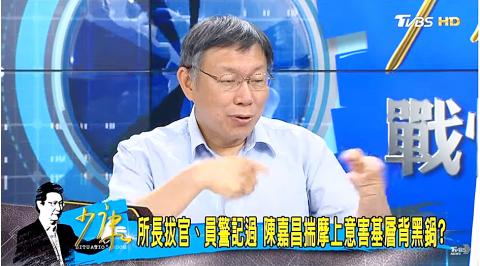Former president Chen Shui-bian’s (陳水扁) personal medical team last night said that Taipei Mayor Ko Wen-je (柯文哲) is no longer fit to be the team’s convener after Ko said that Chen had faked his illness before actually falling ill.
Chen was sentenced to a 20-year jail term for corruption, but was granted medical parole in January 2015 after being diagnosed with illnesses including sleep apnea, suspected Parkinson’s disease and osteoporosis.
In a TV interview with media personality Jaw Shaw-kong (趙少康) that aired on Friday evening, Ko, who was a member of Chen’s voluntary medical team before assuming the mayorship in 2014, was asked about Chen’s health, to which he said Chen “pretended to be sick at first and later actually became sick.”

Screengrab from Jaw Shao-kong Situation Room
Kaohsiung Chang Kung Memorial Hospital Department of Neurology physician Chen Shun-sheng (陳順勝), a member of the medical team, yesterday said that Ko has over the past two years attended the team’s meetings only once or twice a year and has not been fully cognizant of Chen’s health condition for a long time.
Since Ko is convener in name only, the team in a provisional meeting has passed a motion to expel Ko so that he would not misrepresent the team again with inaccurate remarks, Chen Shun-sheng said.
Earlier yesterday, the team’s spokeswoman Janice Chen (陳昭姿) posted a consultation report on Facebook that Ko and Taipei Veterans General Hospital physician Kuo Cheng-deng (郭正典) prepared after visiting Chen Shui-bian in prison on May 9, 2012, to assess his health.
In the report Ko said that “Chen Shui-bian is seriously ill and shows behaviors [characteristic] of anxiety disorder” and “the former president is locked in prison and can only move around in a jail cell of 1.3 ping [4.3m2] — anyone in his situation would likely become sick.”
They also said that Chen Shui-bian showed seven major symptoms that had to be further examined or treated, including gastroesophageal reflux, cold shock, difficulty breathing and chest pain, Janice Chen said.
Reporters yesterday asked Ko whether his remark about Chen Shui-bian was a slip of the tongue as Taipei City Government spokesman Liu Yi-ting (劉奕霆) claimed on Friday evening.
“More accurately, he had a psychosomatic disease at first,” Ko said, adding that it meant Chen Shui-bian had mental problems that affected his physical condition.
Computed tomography and magnetic resonance imaging showed that there were pathological changes in his brain, which led to pathological changes in other body parts, Ko said.
Liu late last night said that Ko’s remarks during the interview were “imprecise” and urged people not to sow discord between Ko and Chen Shui-bian.

CHAOS: Iranians took to the streets playing celebratory music after reports of Khamenei’s death on Saturday, while mourners also gathered in Tehran yesterday Iranian Supreme Leader Ayatollah Ali Khamenei was killed in a major attack on Iran launched by Israel and the US, throwing the future of the Islamic republic into doubt and raising the risk of regional instability. Iranian state television and the state-run IRNA news agency announced the 86-year-old’s death early yesterday. US President Donald Trump said it gave Iranians their “greatest chance” to “take back” their country. The announcements came after a joint US and Israeli aerial bombardment that targeted Iranian military and governmental sites. Trump said the “heavy and pinpoint bombing” would continue through the week or as long

TRUST: The KMT said it respected the US’ timing and considerations, and hoped it would continue to honor its commitments to helping Taiwan bolster its defenses and deterrence US President Donald Trump is delaying a multibillion-dollar arms sale to Taiwan to ensure his visit to Beijing is successful, a New York Times report said. The weapons sales package has stalled in the US Department of State, the report said, citing US officials it did not identify. The White House has told agencies not to push forward ahead of Trump’s meeting with Chinese President Xi Jinping (習近平), it said. The two last month held a phone call to discuss trade and geopolitical flashpoints ahead of the summit. Xi raised the Taiwan issue and urged the US to handle arms sales to

State-run CPC Corp, Taiwan (CPC, 台灣中油) yesterday said that it had confirmed on Saturday night with its liquefied natural gas (LNG) and crude oil suppliers that shipments are proceeding as scheduled and that domestic supplies remain unaffected. The CPC yesterday announced the gasoline and diesel prices will rise by NT$0.2 and NT$0.4 per liter, respectively, starting Monday, citing Middle East tensions and blizzards in the eastern United States. CPC also iterated it has been reducing the proportion of crude oil imports from the Middle East and diversifying its supply sources in the past few years in response to geopolitical risks, expanding

Pro-democracy media tycoon Jimmy Lai’s (黎智英) fraud conviction and prison sentence were yesterday overturned by a Hong Kong court, in a surprise legal decision that comes soon after Lai was jailed for 20 years on a separate national security charge. Judges Jeremy Poon (潘兆初), Anthea Pang (彭寶琴) and Derek Pang (彭偉昌) said in the judgement that they allowed the appeal from Lai, and another defendant in the case, to proceed, as a lower court judge had “erred.” “The Court of Appeal gave them leave to appeal against their conviction, allowed their appeals, quashed the convictions and set aside the sentences,” the judges